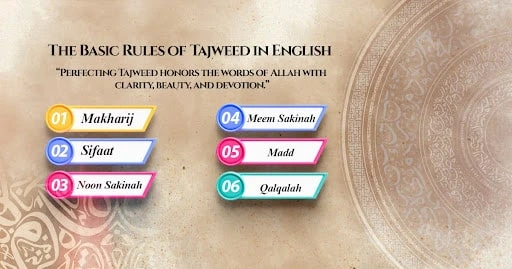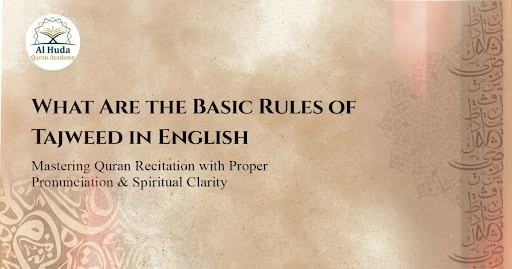Consider, first, the act of reading the Quran with a commentary guarantee of willingness to self-read and accuracy of intellect; imagine reading it with this assurance. This is where Tajweed comes in – a set of rules and principles, known as the rules of Tajweed in English, to aid in maintaining the beauty and accuracy in the recitation of the Quran. Whether you’re a beginner or someone desiring to improve your recitation skills, the information Tajweed provides ensures an authentic connection with the Quran.
Through this guide, we will examine the question “What is Tajweed” as well as its importance in researching and present you with an English friendly version of the most basic rules Tajweed contains. Once again, if you wish to improve on your Quran recitation, this book promises to provide you with clarity and direction to begin the daunting endeavor.
Importance of Tajweed in Quran Recitation
Tajweed is more than a mere skill; it elevates the reciter to that level wherein each recitation resonates with reverence and devotion to the words of Allah (SWT).
- Enhances Spiritual Connection: Tajweed improves the quality of recording a segment of the Quran and permits a better connection to the text.
- Avoid Misinterpretation: A simple slip of the tongue, while uttering certain phrases can greatly alter the significance of a verse. Tajweed makes one stay true to what the Quran means.
- Fulfilling a Duty: According to the Quran, “And recite the Quran in slow, measured rhythmic tones,” (Quran, seventy three: 4) and Tajweed achieves this specifically.
Understanding the Concept of Tajweed

We were able to converse in class about Tajweed, which is defined as the ability to read the Quran while paying attention to pronouncing and articulating the beauty of the words being read. Understanding the rules of Tajweed in English is quite essential in the recitation of the holy Quran, as it guarantees that articulation is observed according to the rules of Tajweed.
What Is Tajweed?
Tajweed comes from “jiaa”- And it means to make something better, or to perform at a higher level than the basic requirements. Tajweed applies to the rules of speech where Phonetics and the speech sounds produced and modified within the Arabic letters and words in the Quran are used.
The Role of Tajweed in Quran Recitation
Like many other arts and sciences, Quranic recitation also has an important tool which is Tajweed. With Tajweed, our fine independent pronunciation is much closer to what is required. The purpose is not only to learn how to recite them perfectly but to appreciate the fine statements of Allah’s words.
Why Is Tajweed Important in Islam?
Knocking over the Quran is more than just a book, but the foundation for any set of laws, gospels, scriptures are considered Holy and even the Torah is. Simply saying that there are a set of rules when reciting the Quran to showcase the utmost respect, while preserving the sanctity of the text, accomplishes as a mark of piety for a believing Muslim.
The Basic Rules of Tajweed in English

Here’s a simplified assessment of the key Tajweed rules that will help you start your getting to know journey.
Makharij (Articulation Points of Letters)
Arabic letters are stated from 17 awesome articulation points within the mouth, throat, and nostril. Learning these factors guarantees clarity in your recitation. For example, the phrase حقّ (haqq) requires proper articulation of the letter ‘qaf’ from the throat.
Sifaat (Characteristics of Letters)
Every Arabic letter has particular characteristics, together with energy, softness, or resonance. For instance, the letter ض (dhad) is heavy, while س (visible) is mild. Recognizing those developments helps with correct pronunciation.
Noon Sakinah and Tanween Rules
These guidelines govern how the letter noon (ن) and tanween sounds are mentioned while observed by using precise letters. They include:
- Ikhfa (Hiding the sound slightly)
- Idgham (Merging sounds)
- Iqlab (Changing sound to ‘mim’)
- Izhar (Clearly pronouncing the ‘noon’)
Meem Sakinah Rules
For the letter meem (م) in a sakin (resting) country, these regulations observe:
- Ikhfa Shafawi (Hiding meem sound through lips)
- Idgham Shafawi (Merging meem sounds)
- Izhar Shafawi (Clear pronunciation of meem)
Important Tajweed Rules for Beginners
A novice-pleasant manual to important Tajweed regulations for correct Quranic recitation.
The Rule of Madd (Elongation of Letters)
Certain Arabic letters are elongated for a specific variety of counts relying on the madd rule. For example, الرحيم (Ar-Rahim) requires stretching the yaa sound at the end.
Qalqalah (Echoing Sounds)
The letters ق (qaf), ط (taa), ب (baa), ج (jeem), and د (dal) exhibit a bouncing echo-like sound when pronounced with sukoon.
Ghunnah (Nasal Sounding Letters)
A ghunnah is a nasal sound that accompanies letters like midday (ن) and meem (م) when reported collectively in positive situations, adding resonance to recitation.
Common Mistakes in Tajweed and How to Avoid Them
A manual to common Tajweed errors and practical tips to correct them for better Quranic recitation.
Mispronouncing Arabic Letters
Arabic has distinct sounds that may be difficult for non-native audio systems. Practice articulation points often to overcome this.
Ignoring Rules of Madd and Stopping Incorrectly
Not elongating letters successfully or pausing at irrelevant factors can distort meanings. Learn stopping symptoms and madd policies for accurate recitation.
Lack of Fluency in Recitation
Fluency develops with consistent practice. Recite day by day and attention on slower, deliberate recitation instead of rushing.
How to Learn Tajweed Effectively
Practical tips and strategies for learning Tajweed effectively and improving Quranic recitation.
Self-Study vs. Learning with a Teacher
While self-study options (like apps and books) are helpful, mastering Tajweed often requires guidance from a qualified teacher to ensure precision.
Best Resources for Learning Tajweed
- Books: “Tajweed Rules of the Quran” by Kareema Carol Czerepinski
- Apps: Tarteel and Quran Companion
- Online Platforms: Bayyinah TV and Quranic.org
How Al-Huda Quran Academy Can Help
Al-Huda Quran Academy offers personalized online Tajweed classes taught by certified instructors. Whether you’re a beginner or advanced learner, they provide expert guidance tailored to your pace.
A Path to Perfect Quranic Recitation
Learning Tajweed is an ongoing system requiring exercise, staying power, and passion. By knowing those simple regulations and usually refining your recitation, you honor the Quran and deepen your religious connection.
Take step one these days. Whether you choose to self-examine or join structured classes like the ones supplied through Al-Huda Quran Academy, recall that each attempt brings you closer to Allah’s phrases.
Frequently Asked questions (FAQs)
Starting with foundational policies, practicing constantly, and mastering below a qualified trainer will make mastering Tajweed less complicated.
Yes, Tajweed focuses on pronunciation and articulation, which may be taught in English without requiring fluency in Arabic.
It depends on your pace, practice, and dedication. With day by day effort, you could see vast development inside some months.

